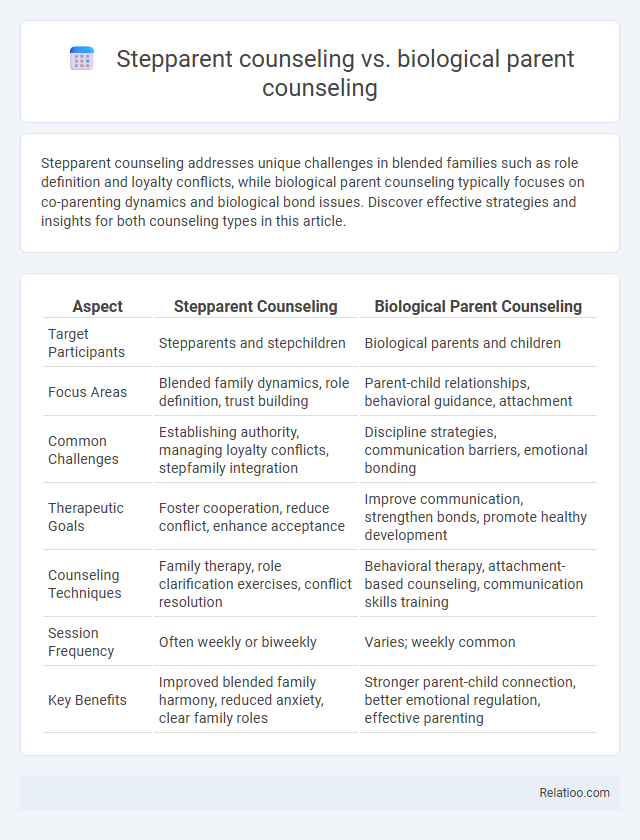Stepparent counseling addresses unique challenges in blended families such as role definition and loyalty conflicts, while biological parent counseling typically focuses on co-parenting dynamics and biological bond issues. Discover effective strategies and insights for both counseling types in this article.
Table of Comparison
| Aspect | Stepparent Counseling | Biological Parent Counseling |
|---|---|---|
| Target Participants | Stepparents and stepchildren | Biological parents and children |
| Focus Areas | Blended family dynamics, role definition, trust building | Parent-child relationships, behavioral guidance, attachment |
| Common Challenges | Establishing authority, managing loyalty conflicts, stepfamily integration | Discipline strategies, communication barriers, emotional bonding |
| Therapeutic Goals | Foster cooperation, reduce conflict, enhance acceptance | Improve communication, strengthen bonds, promote healthy development |
| Counseling Techniques | Family therapy, role clarification exercises, conflict resolution | Behavioral therapy, attachment-based counseling, communication skills training |
| Session Frequency | Often weekly or biweekly | Varies; weekly common |
| Key Benefits | Improved blended family harmony, reduced anxiety, clear family roles | Stronger parent-child connection, better emotional regulation, effective parenting |
Understanding Stepparent Counseling
Stepparent counseling centers on navigating complex family dynamics, addressing challenges unique to forming bonds between stepparents and stepchildren, unlike biological parent counseling that primarily focuses on established parent-child relationships. Counseling for stepparents helps You develop effective communication strategies, manage role ambiguity, and foster trust within the blended family structure. Understanding stepparent counseling provides tailored support that strengthens family cohesion and emotional well-being beyond conventional parenting approaches.
Key Principles of Biological Parent Counseling
Biological parent counseling centers on enhancing parenting skills, addressing attachment issues, and improving parent-child relationships by focusing on emotional bonding and effective communication strategies unique to biological connections. This counseling emphasizes understanding developmental stages and genetic influences while supporting parents in managing inherited behavioral challenges. Unlike stepparent counseling, which may prioritize blended family dynamics, biological parent counseling targets restoring or strengthening the natural parent-child bond through tailored interventions.
Unique Challenges Faced by Stepparents
Stepparent counseling addresses the unique challenges stepparents face, such as navigating boundaries, building trust with stepchildren, and managing complex family dynamics that differ from those experienced by biological parents. Biological parent counseling tends to focus on issues related to attachment, discipline, and biological bonding, highlighting the emotional nuances rooted in genetic ties. Counseling, in general, supports mental health and family cohesion, but stepparent counseling emphasizes strategies for blending families and resolving conflicts specific to non-biological relationships.
Common Issues in Biological Parent Relationships
Biological parent counseling often addresses common issues such as co-parenting conflicts, attachment challenges, and communication breakdowns unique to genetic ties. You may experience emotional complexities related to parental identity and past familial dynamics that differ from the concerns in stepparent counseling, which typically focuses more on blending families and establishing new relational boundaries. Understanding these distinct challenges is crucial for effective counseling tailored to the specific needs of biological parent relationships.
Communication Strategies in Blended Families
Stepparent counseling emphasizes developing communication strategies tailored to navigating complex family roles and fostering trust between non-biological parents and children. Biological parent counseling focuses on maintaining consistent, open dialogue to support the child's emotional well-being and minimize conflicts during transitions. Counseling for blended families integrates conflict resolution techniques and cooperative communication to enhance harmony, respecting the unique dynamics and emotional needs of all members.
Emotional Dynamics: Stepparent vs Biological Parent Roles
Stepparent counseling addresses the unique emotional dynamics stemming from blended family roles, focusing on establishing trust and managing loyalty conflicts that differ significantly from issues in biological parent counseling. Biological parent counseling often centers on attachment bonds and generational parenting patterns influencing a child's development. Your therapeutic journey benefits from understanding these distinct emotional landscapes to foster healthier family interactions and personal growth.
Building Trust and Authority as a Stepparent
Stepparent counseling emphasizes strategies to build trust and establish authority uniquely, addressing the complexities of blending families and navigating existing parent-child bonds. Biological parent counseling often focuses on reinforcing established parental roles and improving communication within the family unit. Your success as a stepparent hinges on specialized counseling techniques that foster respect and clear boundaries, ensuring a harmonious family dynamic.
Addressing Loyalty Conflicts in Blended Families
Stepparent counseling centers on navigating loyalty conflicts unique to blended families by fostering open communication and trust between stepparents and stepchildren, emphasizing role definition and relationship building. Biological parent counseling focuses on supporting biological parents in managing feelings of rivalry and reinforcing parental bonds without undermining new family dynamics. Counseling in blended families integrates strategies from both approaches to address loyalty conflicts comprehensively, promoting emotional balance and healthy family cohesion.
Tailoring Counseling Approaches for Different Parental Roles
Tailoring counseling approaches for stepparents, biological parents, and general parental roles requires addressing unique challenges and dynamics within each context. Stepparent counseling often emphasizes blending families and managing boundaries, while biological parent counseling focuses more on attachment and co-parenting strategies. Your counseling experience can be optimized by selecting techniques that respect the specific emotional needs and relationship complexities inherent to each parental role.
Choosing the Right Counseling Support for Your Family
Choosing the right counseling support for your family depends on the specific dynamics and challenges you face, as stepparent counseling often addresses blended family issues while biological parent counseling focuses on parent-child relationships within traditional family structures. Your decision should consider the counselor's expertise in family systems, communication patterns, and conflict resolution tailored to your unique family makeup. Recognizing these distinctions ensures personalized guidance that promotes healing and strengthens family bonds effectively.

Infographic: Stepparent counseling vs biological parent counseling
 relatioo.com
relatioo.com